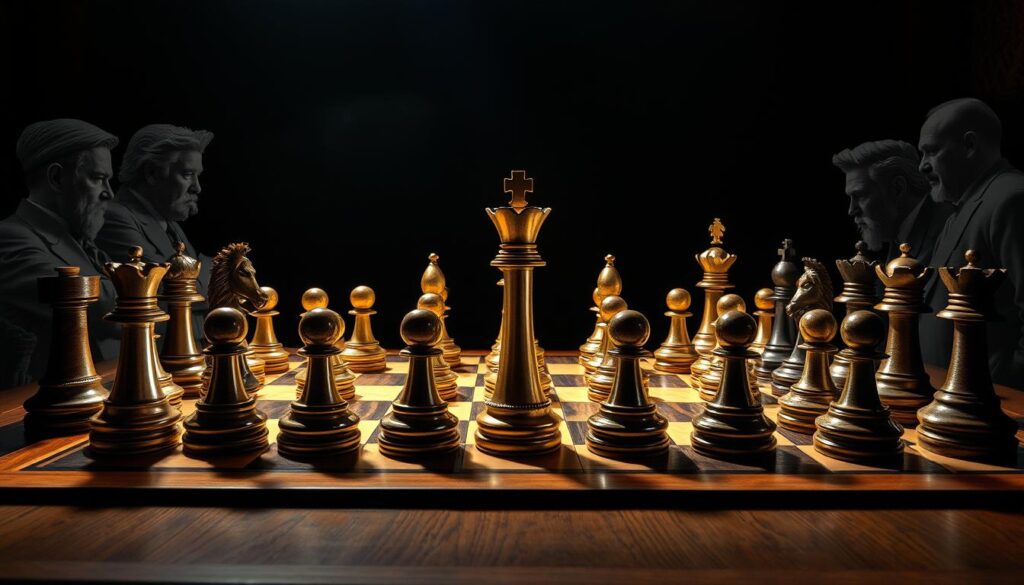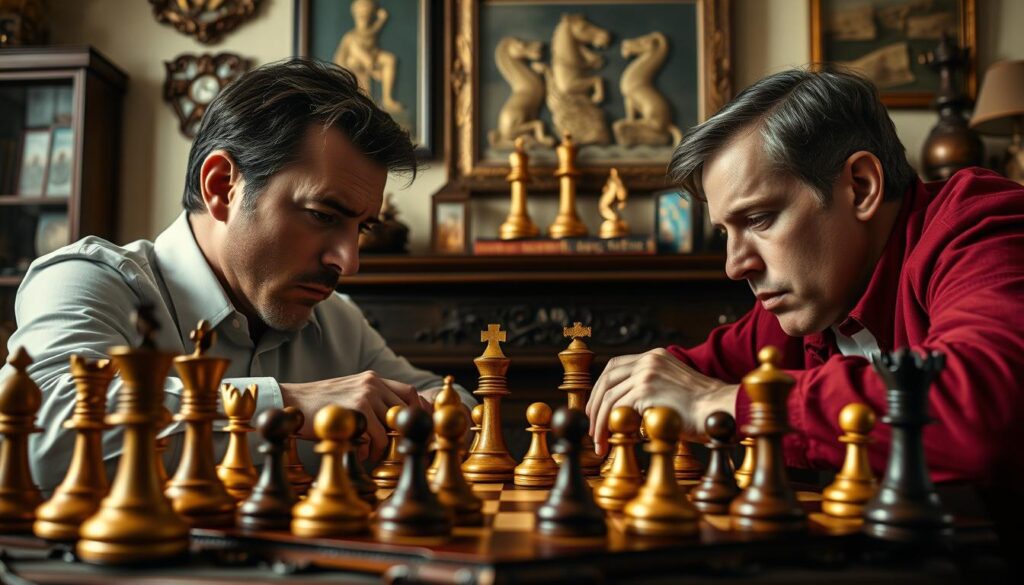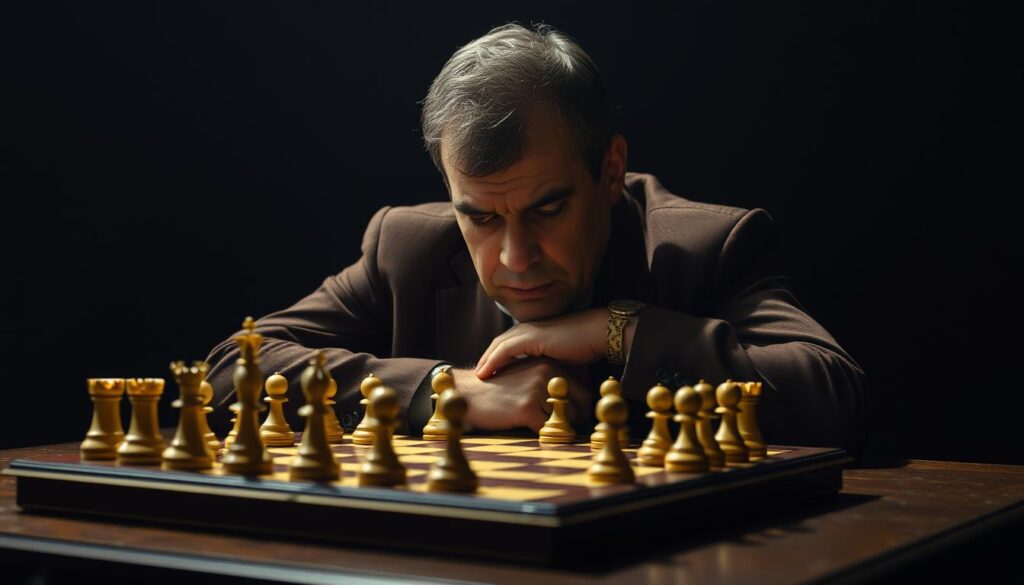When thinking about the greatest chess player of all time, it’s hard to pick just one. Many talented players have made their mark on the game. Magnus Carlsen, for example, reached a record high Elo rating of 2882 in May 2014. But is he the ultimate champion?
To find the greatest, look at their achievements, playing style, and impact on chess. Emanuel Lasker was World Champion for 27 years, a record. Garry Kasparov and Anatoly Karpov each won six world championship matches. The debate among chess fans is ongoing, with many greats vying for the top spot.
Table of Contents
The Evolution of Chess Mastery Through History
Exploring chess reveals how legendary players have shaped the game. From ancient times to today, chess has grown. New strategies and techniques have made it more exciting.
The best chess player in history is often debated. Garry Kasparov is a top contender. Yet, Emanuel Lasker, Mikhail Botvinnik, and Viswanathan Anand have also made big impacts. Lasker, for example, was world champion for 27 years.
Some legendary players have achieved remarkable things. For example:
- Emanuel Lasker’s 27-year reign as world chess champion
- Mikhail Tal’s youngest world champion title at the age of 23
- Vladimir Kramnik’s defeat of Garry Kasparov to become the first undisputed world champion since 1993
- Anatoly Karpov’s exceptional skills in positional play, prophylactic strategies, and endgame technique

The growth of chess mastery shows the game’s lasting appeal. As you learn more, you’ll find out about the best chess player in history and the legendary chess grandmasters who’ve shaped it.
Understanding What Makes a Chess Player Great
To become a world-renowned chess champion, a player needs a special mix of skills and traits. You might ask, what makes the greatest chess player stand out? Is it their strategic mind or their ability to stay calm under pressure?
Some chess players show incredible talent from a young age. For example, Paul Morphy won the U.S. championship at 20. Garry Kasparov became World Champion at 22 in 1985. And Magnus Carlsen was the youngest World Champion at 22, with a peak Elo of 2882.
Here are some key factors that make the best chess players stand out:
- Mastery of strategy and tactics
- Mental and emotional strengths
- Ability to perform under pressure
- Continuous learning and improvement

Players like Hikaru Nakamura and Arjun Erigaisi have also made a mark in chess. Nakamura has a peak Elo rating over 2816. Erigaisi became a Grandmaster at 14. These players, along with others, have shaped chess history. They inspire new players to aim for greatness.
Magnus Carlsen: The Modern Chess Phenomenon
Magnus Carlsen is a top chess player who has greatly influenced the game. He is known for his deep chess understanding and versatility. He became a grandmaster at 13 and has since dominated the game.
Carlsen’s playing style is adaptable, making him a tough opponent. He has won many tournaments and holds the highest rating ever. He is seen as one of the greatest chess players of all time.
Some of his notable achievements include:
- Becoming a grandmaster at the age of 13
- Winning numerous tournaments, including the World Chess Championship
- Setting records for the highest rating ever achieved

Carlsen’s impact goes beyond his playing. He promotes chess worldwide and supports the Esports World Cup. He aims to introduce chess to new fans and inspire young players.
Carlsen is a role model for aspiring chess players. As a legendary grandmaster, he has left a lasting mark on chess history. His skill and dedication make him a legend among top players.
Garry Kasparov’s Legacy and Dominance
Garry Kasparov is seen as one of the best chess player in history. He was known for his bold and creative style. Born on April 13, 1963, in Baku, Azerbaijan SSR, Soviet Union, Kasparov ruled chess for over 20 years. His 15-year reign as World Champion shows his unmatched skill and control.
Kasparov’s achievements prove his talent and hard work. In 1999, he reached a peak FIDE chess rating of 2851. This was the highest until Magnus Carlsen broke it in 2013. Kasparov was World Chess Champion from 1985 to 2000 and was ranked number one for 255 months from 1984 to 2005.
Some of Kasparov’s notable records include:
- Most consecutive professional tournament victories with 15 wins
- Most Chess Oscars won with 11
- Youngest-ever undisputed world champion in 1985 at age 22

Kasparov’s influence goes beyond his playing days. He has coached world-renowned chess champions like Magnus Carlsen. He has also written and promoted chess. His legacy inspires and influences new chess players, making him one of the greatest of all time.
| Year | Event | Result |
|---|---|---|
| 1985 | World Chess Championship | Won |
| 1999 | Peak FIDE chess rating | 2851 |
| 2000 | Lost World Chess Championship | Lost to Vladimir Kramnik |
The Greatest Chess Player of All Time: Bobby Fischer’s Impact
Bobby Fischer is a name you’ll often see in chess circles. He’s seen as one of the greatest chess players ever. His amazing endgame skills and his famous match against Boris Spassky are legendary. His career is a story of fame, unique style, and lasting impact.
Fischer made history by becoming the youngest grandmaster in 1958. He won all 11 games in the American championship in 1964. And he beat Boris Spassky in 1972, winning 12 1/2–8 1/2. These wins cemented his place among the chess elite, earning him the title of “chess genius.”
Here are some key highlights from Fischer’s career:
- Became a National Master at the age of 12
- Won the American Junior Chess Championship at a young age
- Won the title of International Master at the age of 14
- Scored 18.5 points out of 23 in the Palma de Mallorca tournament, securing 1st place
Fischer’s influence on chess is still strong today. Many see him as the greatest chess player of all time. His style, which focused on innovation and improvisation, has inspired many. As one of the top chess players in history, Fischer’s legacy is studied and admired worldwide.
Analyzing Mikhail Botvinnik’s Scientific Approach
Mikhail Botvinnik was a legendary chess grandmaster known for his scientific approach. He won the World Chess Championship three times. His career highlights include victories in the 1936 Nottingham and 1946 Groningen tournaments.
Botvinnik made significant contributions to chess theory. His strategies in opening play are still used today. He dominated chess for over 15 years, leaving a lasting mark on the game.
- He won the World Chess Championship in 1948, and defended it in 1951, 1954, 1957, and 1958.
- Botvinnik also won the USSR Chess Championship in 1931, 1933, 1939, 1941, 1944, 1945, and 1952.
- He published several books on chess, including “Championship Chess” in 1947 and “Selected Games” in 1949.
Botvinnik’s legacy inspires chess players worldwide. His scientific approach has greatly influenced chess theory. His contributions are a key part of the game.
Botvinnik’s career shows the power of dedication and hard work in chess. His story inspires aspiring players. His legacy is celebrated by chess fans globally.
Emanuel Lasker’s 27-Year Reign as World Champion
Emanuel Lasker is often seen as the best chess player in history. He was the World Chess Champion for 27 years, from 1894 to 1921. This long reign shows his unmatched skills and dominance in chess, making him one of the greatest chess player of all time.
Lasker’s career is filled with impressive wins. In 1893, he won all thirteen games in a New York City tournament. He also beat Wilhelm Steinitz in the World Chess Championship match, winning ten games, losing five, and drawing four.
Some of Lasker’s key achievements include:
- Winning the World Chess Championship match against Frank Marshall in 1907, where Marshall could not win a single game
- Defeating Siegbert Tarrasch in the World Chess Championship 1908 with a score of 10½–5½
- Easily winning the world championship match against Janowski in 1909 with a score of 8–2
Lasker’s skills in tournaments and matches made him a top contender for the title of best chess player in history. His 27-year reign as World Champion solidifies his legacy as one of the greatest chess player of all time.
Comparing Playing Styles Across Generations
Exploring chess, you’ll see top players have unique styles. Legends like Magnus Carlsen, Garry Kasparov, and Bobby Fischer each had their own way. Carlsen, for example, is known for his deep game understanding and flexibility.
Technology’s role in chess is key when comparing styles. The game has changed a lot, making it hard to compare old and new players. Yet, studying top players can reveal what makes them great. Key traits include:
- Deep opening preparation
- Aggressive tactics
- Exceptional endgame understanding
- Ability to adapt to different situations
A chess.com survey found 37% think Magnus Carlsen is the greatest. 21% say Bobby Fischer, and another 21% Garry Kasparov. Who’s the best is up for debate, influenced by personal views and era.
Learning from chess legends can boost your game. Whether you’re new or experienced, studying top players can elevate your skills. It’s a great way to deepen your chess knowledge.
| Player | Peak FIDE Rating | World Championship Titles |
|---|---|---|
| Magnus Carlsen | 2882 | 5 |
| Garry Kasparov | 2851 | 6 |
| Bobby Fischer | 2785 | 1 |
Statistical Measures of Chess Greatness
When we talk about the best chess player in history, we look at Elo ratings and tournament wins. The Elo rating system shows a player’s strength and performance. Top players often have Elo ratings over 2800.
The FIDE rating list, updated monthly since 2012, gives us a detailed view of top players’ history. By studying rating changes, we see trends that highlight great players. For example, Bobby Fischer and Garry Kasparov’s peak ratings show their dominance.
Some key stats that show top players’ greatness include:
- The average Elo rating of world-renowned chess champions is much higher than others.
- Top players have shown consistent high performance, with many ratings over 2700 for years.
- The FIDE rating list shows an increase in top players’ average ratings over time, showing the game’s growing competition.
Looking at these stats, we see the debate over the best chess player in history. But by looking at Elo ratings, tournament wins, and other metrics, we understand what makes a player great. As chess evolves, it will be exciting to see new players challenge records and join the ranks of world-renowned champions.
The Role of Personality and Psychology in Chess Success
When you explore chess, you see that being the best isn’t just about skill. Top players have special traits and mental strengths. These help them stay focused and strong when the stakes are high. Perseverance and motivation are key to keep going after tough losses.
Chess success also depends on how you handle losses and pressure. Magnus Carlsen’s mental strength is a big reason for his success. Also, your personality can affect how well you play chess. Some people find it hard because chess needs quiet focus.
Here are some important psychological strengths for chess players:
- Ability to manage stress and pressure
- Capacity to bounce back from losses and setbacks
- Strong motivation and perseverance
- Effective time management and decision-making skills
Learning about personality and psychology in chess can help you understand what makes a player strong. It can also improve your game. This knowledge can make you a better chess player.
Conclusion: Defining the Ultimate Chess Champion
The greatest chess players in history have made a lasting impact on the game. They inspired many with their legendary strategies and unmatched skill. Pioneers like Wilhelm Steinitz and Emanuel Lasker paved the way. Modern stars like Garry Kasparov and Magnus Carlsen continue to push the limits of chess.
Looking at the records of these legendary chess grandmasters shows the depth of chess greatness. The ultimate champion is not just skilled in tactics and strategy. They also have mental strength, emotional resilience, and a spirit of innovation. These world-renowned chess champions have inspired countless players to aim for the top.
As chess evolves, so will the definition of the ultimate champion. Each new generation builds on the legacies of the past. But the true measure of a chess player’s greatness is their lasting impact and the inspiration they give to others.
FAQ
What makes a chess player great?
Great chess players master strategy and tactics. They also have strong mental and emotional skills. These include strategizing, outsmarting opponents, and staying calm under pressure.
Who is considered the greatest chess player of all time?
Chess fans have long debated who is the best. Names like Garry Kasparov, Magnus Carlsen, and Bobby Fischer are often mentioned. They are seen as among the greatest.
How have the playing styles of chess players evolved over time?
Chess playing styles have changed a lot over the years. Each new generation brings fresh strategies and techniques. These have shaped the game into what it is today.
What statistical measures are used to evaluate chess greatness?
To measure chess greatness, we use Elo ratings and tournament results. These stats help us see how strong a player is. They also help compare players to each other.
How does personality and psychology impact chess success?
Personality and psychology are key in chess. Players must stay focused and calm in tough games. Their mental and emotional strength greatly affects their success.

















